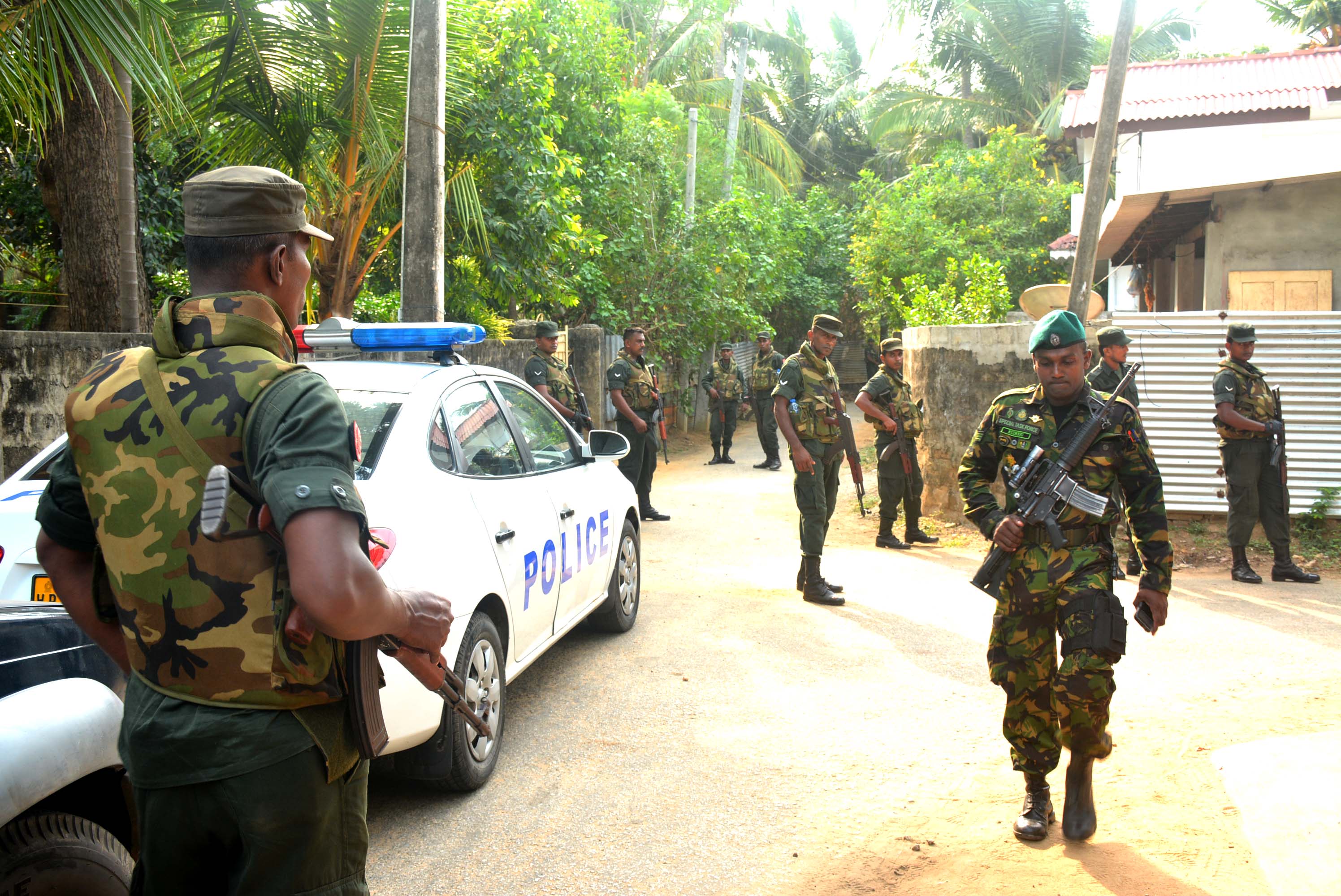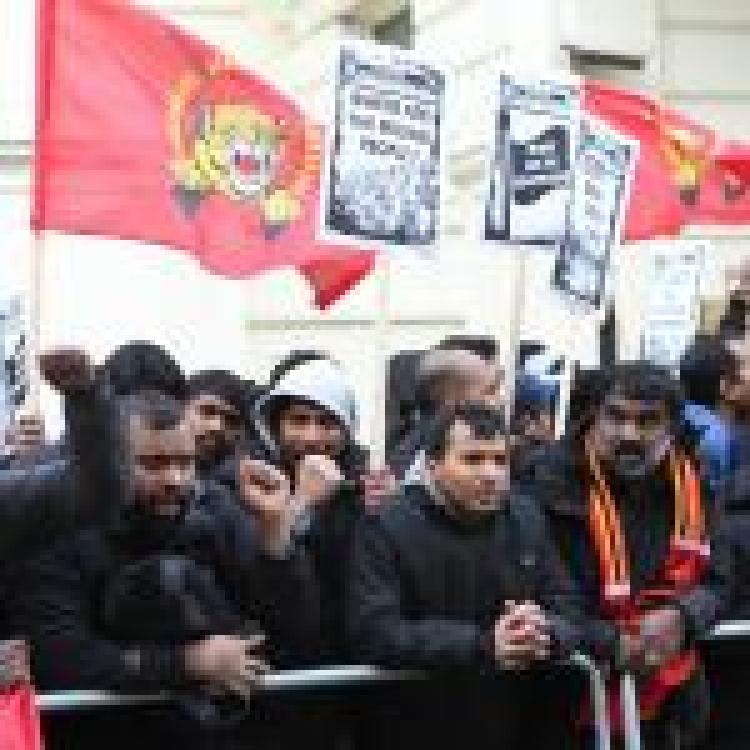A Metropolitan Police officer at a British Tamil protest in London in 2019.
The UK government has decided that it will maintain a ban on the Liberation Tigers of Tamil Eelam (LTTE) this week, in a move that continues to raise questions from British Tamils across the country.
The decision, announced in a letter from British Home Secretary Priti Patel that has been seen by the Tamil Guardian, comes after the UK’s Proscribed Organisations Appeal Commission (POAC) found the initial proscription was “flawed” and called for the decision to be reconsidered last year. It was only the second time in the Commission’s history that such an appeal had been heard in the past twenty years.
The Home Office however stated in its review this week that the proscription needed to continue as the LTTE “continues to be concerned in terrorism” and claimed that any ban on the organisation would not “prevent individuals from engaging in political activity and demonstrations in support of Tamil self-determination”.
‘LTTE continues to be concerned in terrorism’
The most striking argument from the Home Secretary was the decision that “there is sufficient evidence for me to hold a reasonable and honest belief that the LTTE continues to be concerned in terrorism”.
Patel said the decision had been reached following the review of “open-source reporting and sensitive intelligence, analysis from across Government, law enforcement and intelligence experts”. Though the Home Secretary added that she was “unable to comment on specific intelligence” she pointed to two incidents in particular that she “placed greatest weight on the following in reaching my conclusion”.
The first incident occurred in July last year, in which former LTTE cadre Thangarasa Devadasan was killed in a reported explosion in Kilinochchi. At the time Sri Lankan security forces claimed that Devadasan was attempting to manufacture an explosive device and that they had discovered a banner to mark Black Tigers Day at his home. An article on Sri Lanka’s Ministry of Defence, which published a photograph of a heavily bandaged, bed-bound Devadasan before he died, also claimed that he and his wife received funding from abroad “to create incidents in the North”.
.jpg)
A banner to mark Black Tigers Day that Sri Lankan police claimed to have discovered at Devadasan's home in 2019.
The second incident that Patel described was the arrest of a Tamil family travelling to Kandy from Jaffna, after they were stopped in Kilinochchi allegedly carrying an explosive in December of the same year. The Sri Lankan security forces claimed that the woman was a former LTTE cadre and that she had received funding from a "foreign LTTE network”. They went on to launch raids on those close to the family in Jaffna. Both incidents were reported by the Tamil Guardian, as part of a spike in the arrest of Tamils in recent months.
Attributing the above incidents to “small cells of individuals who were members of the traditional military structures of the LTTE prior to 2009,” Patel went on to claim, “these cells continue to act on behalf of the LTTE and advance its objectives and ideology through traditional covert terrorist tactics”.
The Sri Lankan government, which initially said it would “closely monitor” the challenge to the ban last year, released a statement that said it was “appreciative of the partnership with the UK” as news of the continued ban broke this week.
‘Disappointing reliance on Sri Lankan intelligence’
Sri Lankan security forces conducting a raid in Jaffna, 2019.
“We are extremely disappointed that the Home Secretary has once again chosen to rely on intelligence from the Sri Lankan state,” said Siva*, a British Tamil activist who has worked with the UK government on Sri Lanka. “As we all know, Sri Lankan intelligence has proven not only to be unreliable but also extremely biased. Arrests are arbitrary and made on little to no evidence, with Tamils routinely targeted by the state.”
Indeed, the two incidents that Patel referred to were among dozens of arrests of Tamils that have taken place in recent months, with the Sri Lankan security forces claiming that attempts had been made to “regroup the LTTE”. Many of the arrests take place under Sri Lanka’s much-criticised Prevention of Terrorism Act (PTA), which has seen Tamils arrested for a broad range of alleged offences, from posting on social media platform Tik Tok to playing songs at political rallies.
Devadasan’s death in July 2020 came amidst a spate of arrests in the North-East, with the Sri Lankan security forces arresting more than 20 Tamils on charges of “regrouping the LTTE” in the week before the explosion alone. Amongst those arrested was a 17-year-old child. The arrests also came amidst campaigning for Sri Lanka’s parliamentary elections the following month, with a similar crackdown on Tamils across the North-East during presidential elections the previous year.
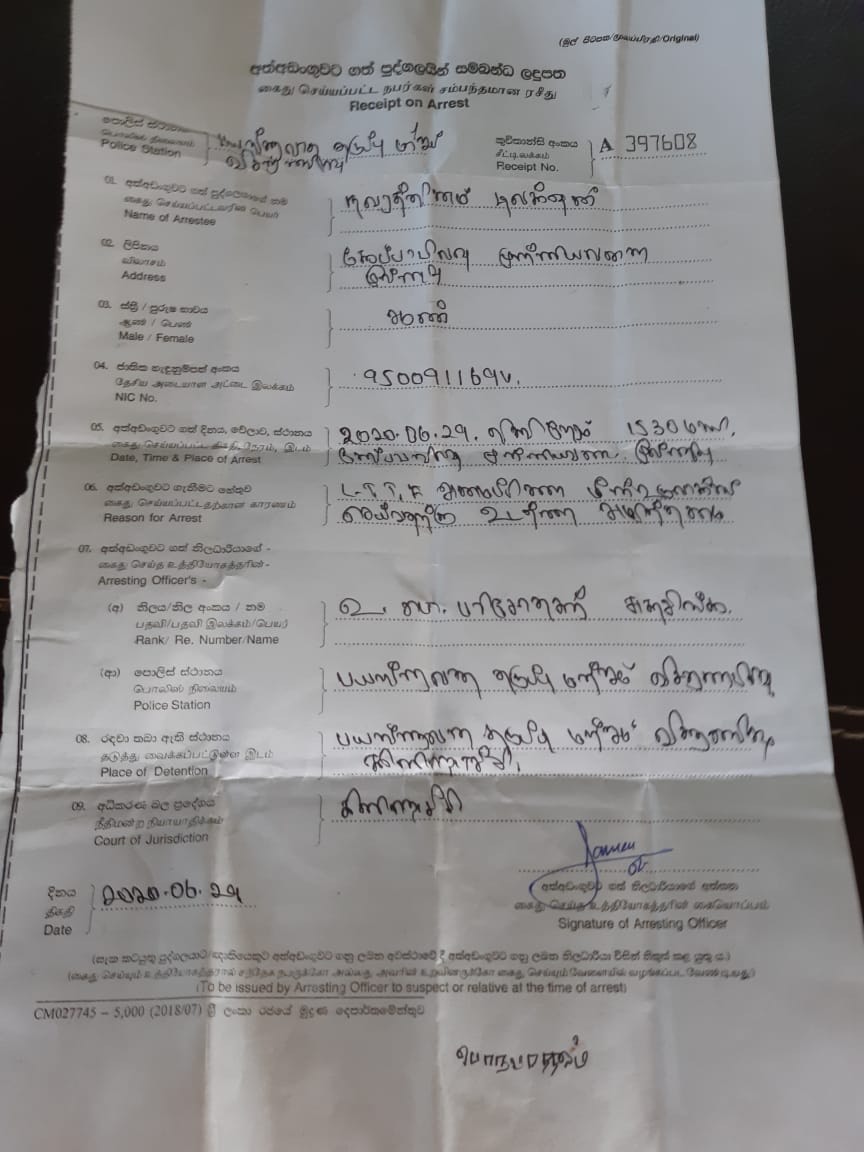
An arrest sheet used in the detention of a Tamil youth last year, claiming that he was attempting to regroup the LTTE.
Since then, the arrests and detentions have continued. Earlier this year, even the Mayor of Jaffna was detained by Sri Lanka’s counter-terrorism police under the PTA, allegedly for “promoting” symbols associated with the LTTE, after he assigned light blue coloured uniforms to a newly set-up Jaffna unit to monitor environmental violations. “The government is seeing a ghost behind every bush,” Tamil parliamentarian M A Sumanthiran said at the time.
Just weeks ago, a Jaffna court ordered the complete release of five Tamils who had been detained for 93 days after Sri Lanka’s Terrorism Investigation Division (TID) notified the court that there were “no charges to file against them”.
“Arrest first & investigate later,” tweeted Ambika Satkunanathan, the former commissioner of the Human Rights Commission of Sri Lanka.
“From the repeated racist targeting of Tamils to the intelligence failures that were behind the devastating Easter Sunday attack, the Sri Lankan security forces have clearly demonstrated for years why they cannot be relied upon,” Siva* added. "Why is any information from them still being trusted?"
Recognition of Tamil Eelam flag
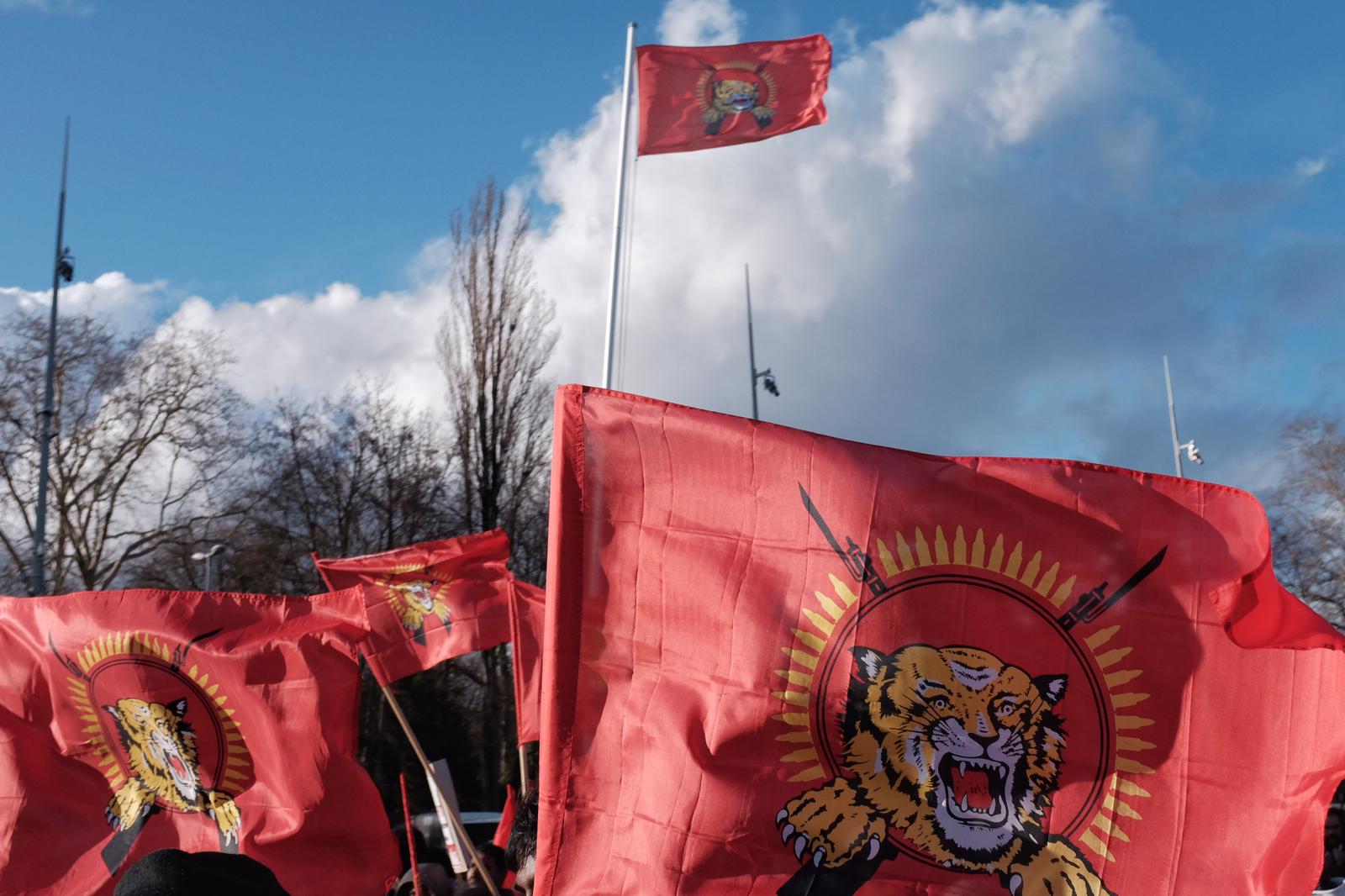
Tamil Eelam flags at a protest in Geneva, 2019
The Transnational Government of Tamil Eelam (TGTE), who led the application to remove the LTTE from the UK’s list of proscribed organisations, said that it was currently consulting with its lawyers regarding the next steps of its legal challenge.
"I am not surprised that the Home Secretary has decided to maintain the ban," said a lawyer who is familiar with the case and the activists involved. "She wants the Tamil activists to take the matter to the POAC again and ask the Court to make an Order for the LTTE to be removed the list of proscribed organisations this time so that the Judges can be blamed for removing the ban."
"She conceded in the recent Sri Lankan country guidance case that Sri Lankan authorities torture terror suspects in a widespread and systematic manner. So how can she rely on the evidence gathered by Sri Lankan authorities to maintain the ban?" he added.
Other activists, however, pointed to Patel’s recognition of the distinction between the Tamil Eelam flag and that of the LTTE, in a move that has been welcomed by British Tamils.
Patel said that a cyber-attack on Sri Lanka government websites by unknown perpetrators last year would have been carried out on behalf of the LTTE by the ‘Tamil Eelam Cyber Force’, due to the “specific use of the LTTE flag rather than the Tamil Eelam flag”.
“It is encouraging to note that the Home Secretary recognises the legitimacy of the Tamil Eelam flag,” added another South London-based Tamil activist. The flag is routinely displayed by the sizeable Eelam Tamil diaspora in the UK, from cultural and sporting events to memorials and political rallies. "It is a part of our struggle, but more importantly a part of our identity,” the activist continued.
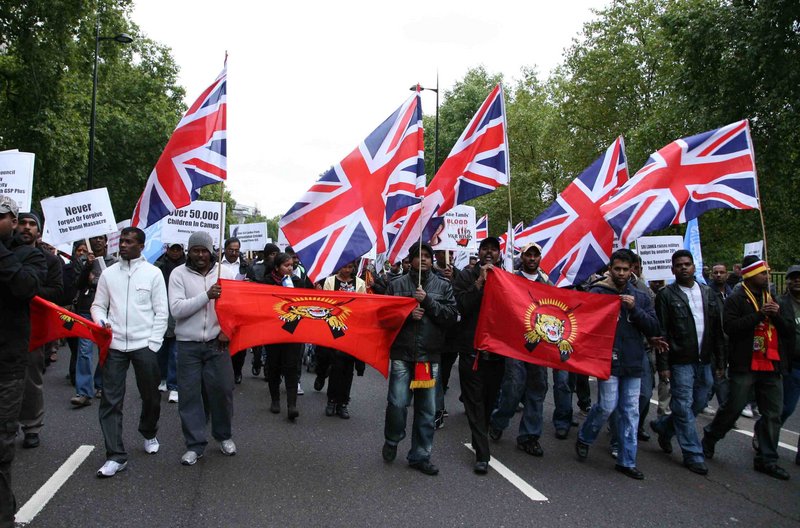
British Tamils with Union Jack and Tamil Eelam flags in London, 2009.
The UK assertion that the proscription of the LTTE “does not prevent individuals from engaging in political activity and demonstrations in support of Tamil self-determination,” was also welcomed.
“Though the continued ban on the LTTE is disappointing, the assurance that there will be space for Tamil self-determination struggle to continue is encouraging,” added Siva*. “We will continue to engage with governments and activists around the world on our cause. Our struggle will continue.”
_____
*names changed on request.

